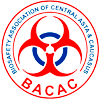Canada’s Global Partnership Program (GPP)
http://www.international.gc.ca/gpp-ppm/global_partnership-partenariat_mondial.aspx?lang=eng
Established in 2002, Canada’s Global Partnership Program has supported the Global Partnership Against the Spread of Weapons and Materials of Mass Destruction with concrete projects to prevent WMD proliferation and terrorism and reduce nuclear, radiological, biological or chemical threats.
Government of the United Kingdom of Great Britain and Northern Ireland
https://www.gov.uk/government/world
European Commission
Defense Threat Reduction Agency (DTRA)
The Defense Threat Reduction Agency (DTRA) is an agency within the United States Department of Defense for countering weapons of mass destruction (chemical, biological, radiological, nuclear, and high explosives). DTRA’s main functions are threat reduction, threat control, combat support, and technology development.
International Science and Technology Center
The International Science and Technology Center (ISTC) is an intergovernmental organization connecting scientists from Kazakhstan, Armenia, Tajikistan, Kyrgyzstan, and Georgia with their peers and research organizations in the EU, Japan, Republic of Korea, Norway and the United States. ISTC facilitates international science projects and assists the global scientific and business community to source and engage with CIS and Georgian institutes that develop or possess an excellence of scientific know-how.
Science and Technology Center in Ukraine
STCU’s mission is to advance global peace and prosperity through cooperative Chemical, Biological, Radiological, and Nuclear (CBRN) risk mitigation by supporting civilian science and technology partnerships and collaboration that address global security threats and advance non-proliferation.
Biosecurity Engagement Program (BEP)
The Biosecurity Engagement Program (BEP) was first funded in 2006 and is part of the Nonproliferation, Anti-Terrorism, Demining and Related Programs Global Threat Reduction programs managed and implemented by the U.S. Department of State Bureau of International Security and Nonproliferation Office of Cooperative Threat Reduction (ISN/CTR). The BEP mission is to engage life scientists and to combat biological threats worldwide by providing assistance to improve biosecurity, biosafety, pathogen surveillance, and infectious disease surveillance and response.
Civilian Research and Development Fund (CRDF Global)
Founded in 1995, CRDF Global is an independent nonprofit organization that promotes international scientific and technical collaboration through grants, technical resources, training, and services. Based in Arlington, Virginia with offices in the Eurasia and MENA regions, CRDF Global works with more than 40 countries in the Middle East, North Africa, Eurasia, and Asia. It specializes in bringing isolated scientific communities into the scientific mainstream through a variety of science engagement and capacity-building programs. CRDF Global encourages science cooperation between countries where official relations are strained.
American Biological Safety Association (ABSA)
The American Biological Safety Association (ABSA) was founded in 1984 to promote biosafety as a scientific discipline and serve the growing needs of biosafety professionals throughout the world. The Association’s goals are to provide a professional association that represents the interests and needs of practitioners of biological safety, and to provide a forum for the continued and timely exchange of biosafety information.
European Biosafety Association (EBSA)
European Biosafety Association (EBSA) was founded in June 1996. It is a not for profit organization which aims to provide a forum for its members to discuss and debate issues of concern and to represent those working in the field of biosafety and associated activities. The Association has individual members, representing over 24 countries in Europe, as well as other regions. EBSA is open to anyone working in the field, providing unique networking opportunities. Members range from students to senior professionals, from disciplines as diverse as healthcare, academia, emergency response, pharmaceutical/biotech industries and regulatory affairs.
The International Federation of Biosafety Associations (IFBA)
IFBA is a not-for-profit non-governmental international organization (NGO) dedicated to strengthening biosafety and biosecurity at the national, regional and international levels. Established in 2001, the IFBA implements biosafety programs through partnerships among national and regional biosafety associations, NGOs, academia, policy makers, governments, international agencies, private industry, donor organizations and stakeholders.
National Biosafety Association (ANBio) of Brazil
The National Biosafety Association (Associação Nacional de Biossegurança)- ANBio was created in 1999 by a group of scientists concerned with disseminating information about the advances of modern biotechnology and its control mechanisms, which are fundamental for technological incorporation and simultaneous preservation of our biological diversity. Attentive to the risks arising from laboratory and industrial activities, transport and release to the environment and other activities involving the health and agricultural sectors, target issues of ANBio, biosafety is coming up in Brazil as a multidisciplinary scientific field. Professionals from the most different areas, among others biology, biomedicine, agronomy, food science, pharmacy, chemistry, medicine, nursing, nutrition, architecture and law are brought together in this young discipline.
The African Biological Safety Association (AfBSA)
AfBSA is a non-governmental, non-political, non-sectarian and non-profit making through which its members work, co-operate and collaborate with one or each other, or with other associations, scientific or health organizations, institutions or individuals throughout Africa or elsewhere in the world.
Asia-Pacific Biosafety Association (A-PBA)
A-PBA began on 22 Feb 2005 and is already representing over 800 practicing biosafety professionals from more than 40 countries across the Asia Pacific region and outside the region namely (Afghanistan, Australia, Bangladesh, Belgium, Benin, Brunei, Cambodia, Canada, Chad, Chile, China, France, Germany, Hong Kong, India, Indonesia, Ivory Coast, Japan, Kenya, Korea, Lao PDR, Macau, Malaysia, Mali, Mexico, Myanmar, Netherlands, New Zealand, Pakistan, Philippines, Singapore, Sri Lanka, Sweden, Switzerland, Taiwan, Thailand, Uganda, United Arab Emirates, United Kingdom, USA, Vietnam, Zambia)

